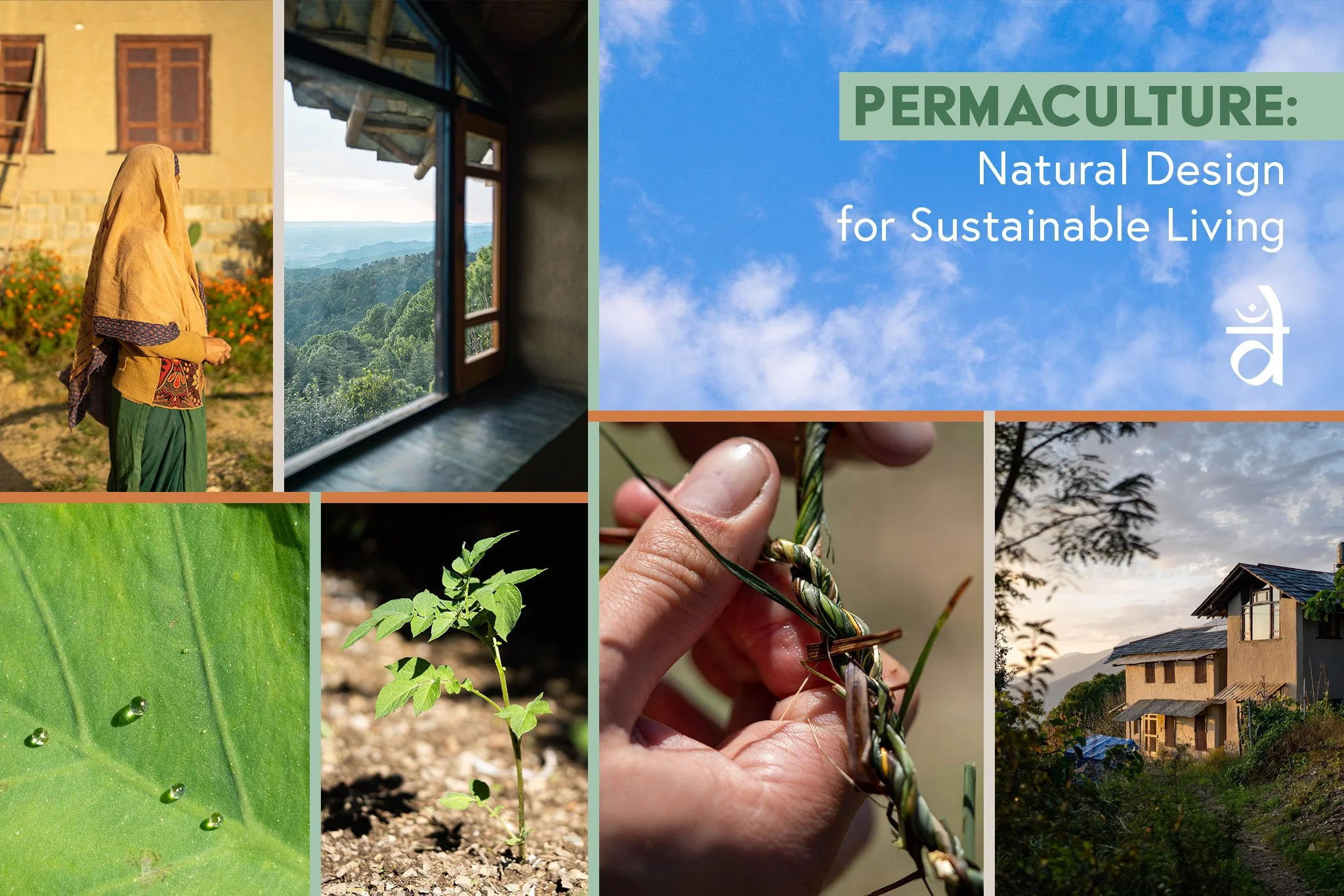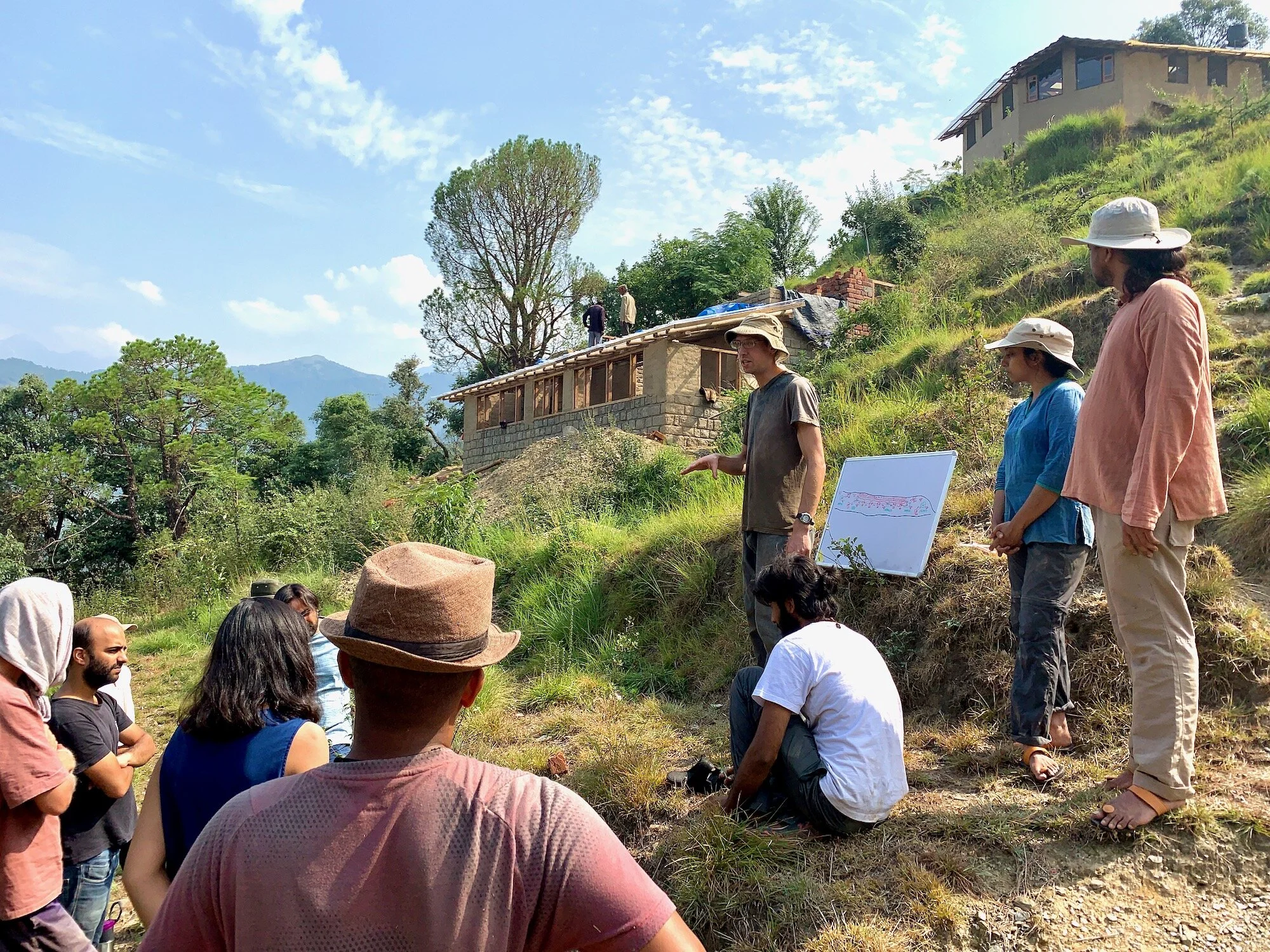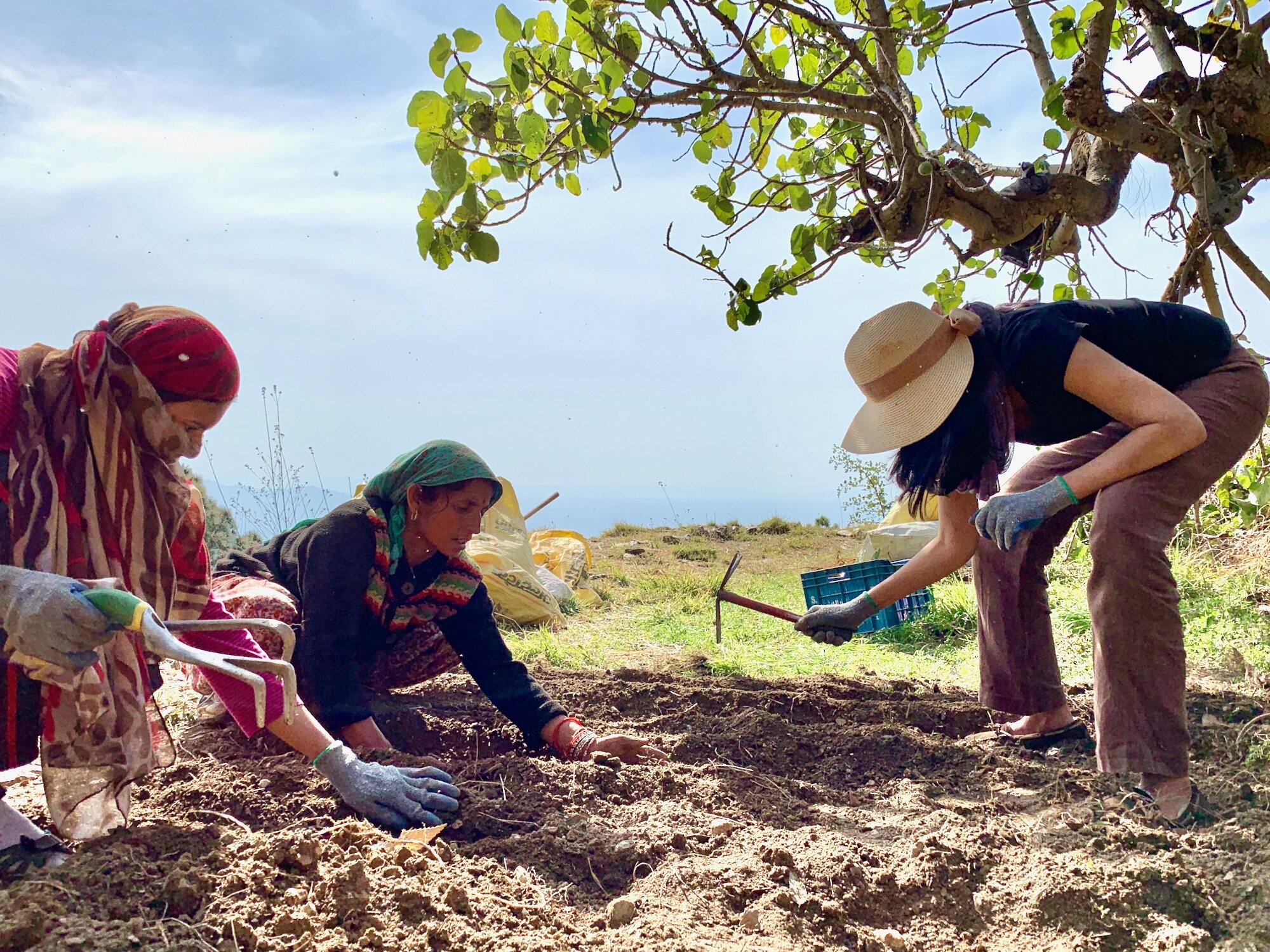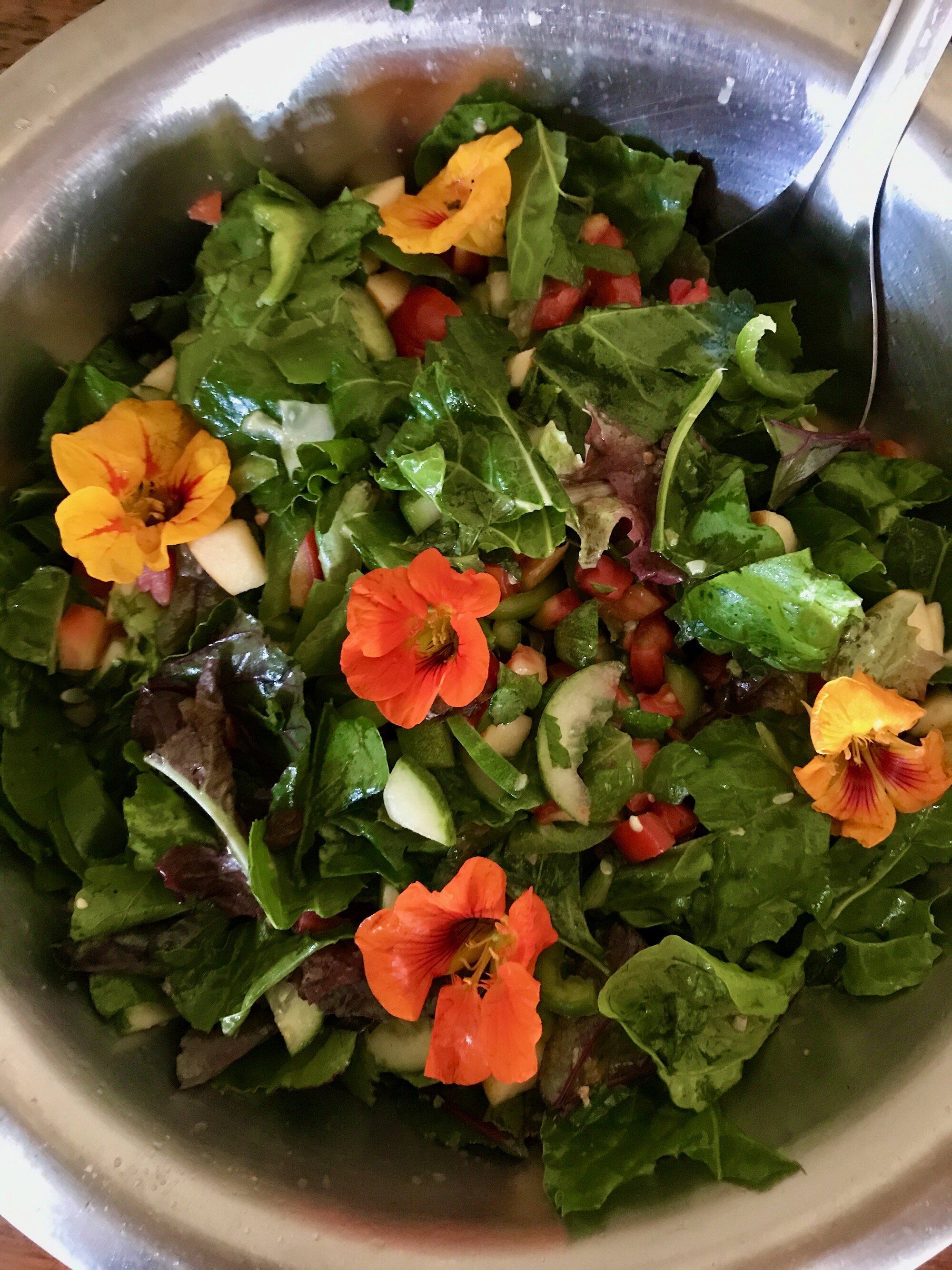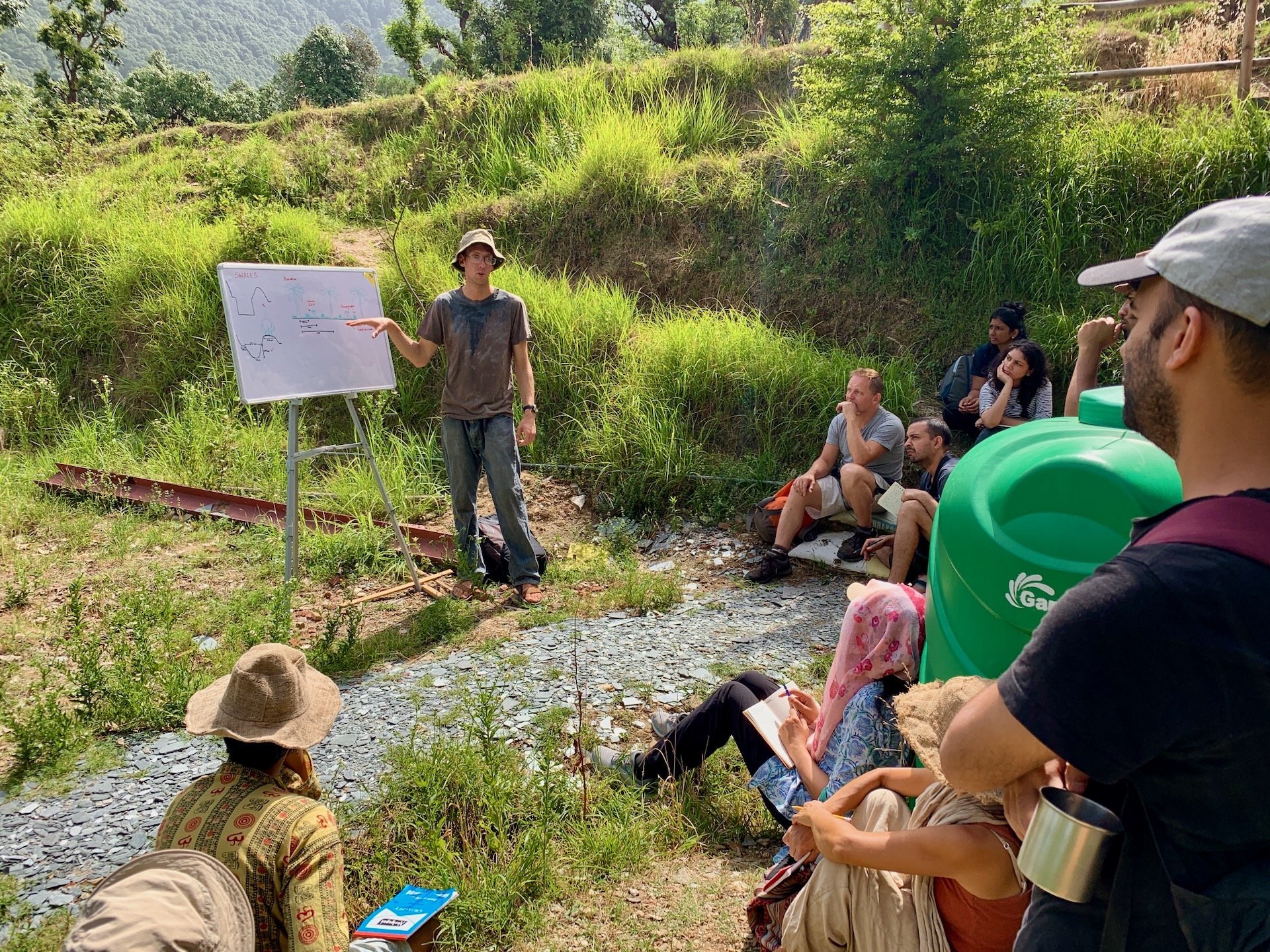A three-month immersive residential programme exploring natural design for sustainable living through the lens of Permaculture principles and practices with a contemplative approach
Overview
Dates: Applications are now closed.
Duration: 11 weeks (with possibility of staying on longer to gain experience by volunteering)
Topic: Permaculture — a contemplative approach to natural design for sustainable living
Location: Dharmalaya Institute, Bir, India
Course type: Immersive residential (with some online sessions as well)
Facilitators: Robyn Hewson, assisted by Dharmalaya Institute staff and volunteers, plus periodic remote (Zoom) sessions with Dharmalaya cofounders Mark & Mai-Linh
Cost: Sliding scale (see below)
Building a Better World? Yes, this programme qualifies as a module within the Building a Better World course and earns credit toward the completion of that course.
Course synopsis
You are invited to join us at the beautiful Dharmalaya Institute eco-campus for a three-month immersive residential programme to explore how Permaculture design can open us to a deeper understanding of the world around and within us, and empower us to work in ecological and sustainable ways toward building the world we want to see.
What’s more, you will have opportunities to apply the skills and sensitivities you’ll be developing in the course in the real-world context of the work of Dharmalaya Institute itself.
And, in that process, you will have the opportunity to be a part of the team that will shape the future of the Institute — a rare and precious opportunity to make a major impact.
What is Permaculture?
Permaculture is a design practice grounded in the ethics of ‘earth care, people care and fair share’. Drawing on traditional knowledge and sustainable systems of living from many different climates and cultures, it seeks to understand and work with the natural patterns that shape landscapes and the activities of the living beings within them, in all their diversity.
The Permaculture approach seeks ways for us to live sustainably within our environment, taking responsibility for our own actions and their impact, recognising the interconnectedness of everyone and everything in nature — as living systems within larger living systems. It prompts us to design our homes, our gardens, our communities and ourselves with intention; in such a way that these whole systems, as well as the individual elements within them, thrive and flourish.
‘Permaculture is a philosophy of working with, rather than against nature; of protracted and thoughtful observation rather than protracted and thoughtless labour; and of looking at plants and animals in all their functions, rather than treating any area as a single product system.’
— Bill Mollison
In short, Permaculture design thinking requires us to quiet ourselves and open up to the art of listening and being within the landscape; to explore insightful and creative solutions for greater health, ecological sensitivity, and harmony between all living things; and to take responsibility for our own existence, within the context of our broader community and ecosystem.
Primary topics & activities
Understanding ourselves in relation to the whole: Getting to know ourselves in relation to the world around us, and revealing the unique contributions that we have to make in support of flourishing communities and ecosystems.
Exploring our role as compassionate leaders and change makers: The world is calling us to action. How do we empower change within ourselves and within the larger community towards a more compassionate and sustainably flourishing world?
Observation of nature inside and out: Finding the stillness within ourselves, and engaging all our senses in our interactions with nature; becoming sensitive to natural patterns and cycles; understanding nature as mother and teacher.
Introduction to the foundational principles and concepts of Permaculture: Understanding ethics, principles and core concepts, as well as methods for design.
Ecosystem functions: Exploring water cycles and water harvesting; healthy living soils; trees and their vital roles in our ecosystem. Understanding the dynamics of climate and context and how these influence our designs.
Design thinking: Participants will work step by step through the design process; applying design thinking to create an integrated Permaculture design for the campus.
Learning through doing: The first of the twelve Permaculture principles — Observe and Interact — call us not only to contemplate the world around us but also to engage in it through doing. This course is about embodied learning, with opportunities to put theory to practical application, and to explore opportunities for long term implementation of projects as part of the Dharmalaya community.
Building a Better World: This Permaculture course is designed to serve as both a stand-alone course and as a module within Dharmalaya Institute’s long-term Building a Better World course. Accordingly, the first three weeks of the course will be interwoven with the Building a Better World intensive training workshop-retreat, providing a comprehensive introduction to our contemplative approach to sustainable and compassionate living, designed to empower you as an insightful, sensitive, and effective agent of change, and to help you develop your skills for making your inspirations into realities.
Programme structure
Further details on the course structure will be published here soon.
Who is this programme for?
This programme is open to anyone wishing to:
Ground your understanding in the core principles and ethics and methods of permaculture design.
Become more attuned to, and aware of, the patterns of the landscape and how these can communicate the health and capabilities of ecosystem functions.
Learn through doing, and through service: taking the theory into real world applications in support of the Dharmalaya campus and surrounding landscape, and engaging your senses and effort in this process.
Gain experience in Permaculture design thinking, applying the principles and practices through the process of creating a Permaculture design.
Make an in-depth, interdisciplinary exploration of compassionate living and caring community.
Be a part of a small, intimate group of kindred spirits collaborating in service
Reflect honestly on your outer and inner life, with the intention to learn and grow.
Experience well-being through simple, healthy living and daily contemplative practice in an ashram-style environment.
Participate fully in the programme and the community, including attending all sessions (six days per week) and remaining safely within our Himalayan eco-campus during the evenings and nights.
What to expect
Two of the keys to happiness are: (1) to have realistic expectations to begin with; and (2) not to be too attached to those expectations, but rather to stay flexible as life unfolds. With that in mind, here are some of the things participants should expect (while remembering to keep a flexible attitude):
Programme focus: This programme is called ‘immersive’ because the point is to spend most of our time focused on the learning and experiences of the programme. While there will be some time for rest, reading/journaling, and personal reflection, there won’t be much time for pursuing other activities unrelated to the programme. While you’re here, the expectation is that most of your attention will be focused on the programme experience from start to finish.
Collaborative project work: This course will require working in groups – with people of various backgrounds, skills and experience – in order to complete various tasks and projects. This can be challenging, but incredibly rewarding when we are able to integrate and fully harness the diverse strengths and different perspectives that people bring to the group.
Supportive routine: A daily rhythm of contemplative practice, outdoor activities, discussions, and silent meditation time.
Natural simplicity: Rustic accommodations in natural earthen buildings or comfortable tents in a beautiful forest setting.
Yogic lifestyle: Clean and simple ashram-style lifestyle in which everyone contributes to the running of the place, including cleaning, washing dishes, etc.
Healthy food: Natural and mostly organic, purely vegetarian meals (100% plant-based, vegan). No junk food or packaged snacks, etc.
Digital detox: There will be no use of mobile phones or internet from 9-5 or during evening sessions so that everyone stays focused on the group tasks, and present with one another — and with our own experience. For those who are normally glued to your phones, it may take some adjustment at first but soon you’ll be amazed how much better you feel engaging with nature and good work with good people rather than the screen.
Campus life and the experience of living in community
Most of our past long-term participants tell us that experience of being a part of the Dharmalaya community, living and working together, is one of the best parts of the experience for them.
We emphasize a culture of kindness and cooperation rather than selfishness and competition, and it’s great to live with kindred spirits in that kind of atmosphere.
Dharmalaya maintains an environment in which everyone is supported to learn and grow in this way, and this kind of learning truly changes lives for the better, because few lessons are more valuable than those that help us understand ourselves and others better and learn to relate with others more sensitively and skilfully.
So one thing to understand is that learning to be a healthy part of a healthy community is one of the most important aspects of all of our residential programmes — and of compassionate living more generally — so that kind of inner work and social evolution should be something that appeals to you strongly if you’re thinking of applying for this programme.
We’ll be spending a good bit of time talking about it and asking you to self-reflect, journal, and share with others about your experiences, which benefits everyone.
Schedules & dates
Start and end dates
The programme will begin at 10:00am on 17th March, 2025. All newly arriving participants will be required to arrive sometime between 9:30am and 9:45am on the 17th itself (we will provide detailed timing, instructions, and travel tips after confirming your registration). Note that it is not possible to arrive at Dharmalaya on a Sunday, so if you arrive in Bir before the 17th, you would need to stay at a hotel or guest house in Bir until the morning of the 17th and then leave Bir between 9:00 and 9:15 am on the 17th in order to reach Dharmalaya at the correct time. We will provide detailed instructions and travel tips after confirming your registration.
The programme will conclude at 3:30pm on the last day. Participants who are leaving after the programme should plan to depart between 3:45pm and 4:30pm.
Participants who complete this programme successfully may apply to remain longer as a volunteer (with reduced fees starting after the end of the fourth month - see below for details).
Daily schedule: What will the days be like?
Although the day-to-day schedule will vary a bit, the schedule for a typical day during this programme would more or less as follows:
6:00 Wake
6:30 Morning practice (meditation/yoga)
8:00 BREAKFAST
9:00 Morning work session (or learning activity)
12:30 LUNCH
1:30 Afternoon work session (or learning activity)
5:00 Personal time
6:00 DINNER
7:00 Evening activity or personal time (various depending on situation)
9:30 Lights out, silent time until breakfast
About your instructors & facilitators
Primary instructor: Robyn Hewson
Robyn completed her first permaculture design course (PDC) online with Geoff Lawton in 2019, and attended a month-long permaculture internship with him at the Greening the Desert site in Jordan. She is now a teaching assistant for his online permaculture design course. In 2024, she completed a second face-to-face PDC at Aranya Permaculture farm in Telangana, India.
Robyn spent 2020 at Navdanya Biodiversity conservation farm outside Dehradun, working in the fields and seed bank, learning about traditional Indian agricultural practices and seed saving from farmers. This inculcated a deep appreciation of traditional wisdom and the importance of understanding and working with local context and community.
She is a certified lab tech with the Soil Food Web School, and has worked with small farmers and market gardeners in Australia, and now in India, to better understand and improve their soil health.
‘The choices that we make about how we meet our basic needs – for food, for shelter, for warmth and community – fundamentally affect our capacity for health, vitality and happiness. And this is not just for ourselves, but for our communities, our gardens and the animals in our care, and for the ecosystem of the whole planet. Taking responsibility for meeting our own needs, in line with the permaculture ethics of earth care, people care and fair share, is incredibly empowering and hopeful. It connects us back to the earth and all beings who share it with us.’
Robyn is passionate about learning from, and working with, natural systems in order to create healthy living soils, nourishing food, healthy lifestyles and thriving landscapes. She is on a journey of discovery, and would like to walk with you on that path, sharing the insights and experiences we gain as we as travel together.
Robyn will be on site for in-person instruction during the first three weeks and final weeks of the programme, and in between she will be present via regularly scheduled remote sessions (via Zoom).
Robyn Hewson
Guest instructors: Dharmalaya cofounders
Mark and Mai-Linh, cofounders of Dharmalaya Institute, will offer periodic remote sessions, especially during the first three weeks and at the conclusion (timings and details to be announced).
Other facilitators
Additional facilitation will be provided by Dharmalaya Institute’s local village staff members and long-term volunteers.
Programme fee
Dharmalaya Institute is a not-for-profit charitable and educational organisation, and as such seeks to make its programmes accessible everyone. Recognizing that our participants come from diverse backgrounds, we are providing a sliding scale with three tiers, to make it possible for each participant to give according to their means.
Total fees for this eleven-week course (inclusive of shared accommodation, three healthy meals daily, and tea), at each of the three tiers are as follows:
Standard rate
(For most participants)
Rs 10,500/week
x 11 weeks
= Rs 115,500 total
For transparency: This standard rate is essentially a break-even rate, just enough to cover the Institute’s total average monthly costs in providing this course.
Subsidized rate
(For low-income participants unable to pay the standard rate)
Rs 7000/week
x 11 weeks
= Rs 77,000 total
For transparency: This subsidized rate is approximately 33% below our break-even rate, which means it is not enough to cover the Institute’s costs in providing the programme, though that shortfall might be covered by participants who choose to pay the ‘Supporter rate’.
Supporter rate
(For those who can afford to help subsidize low-income participants)
Rs 14,000/week
x 11 weeks
= Rs 154,000 total
For transparency: This supporter rate is approximately 33% above the break-even rate, and 100% of that surplus will be used to support lower-income applicants to participate at the subsidized rate. We thank you sincerely for your generosity in choosing this rate if you can.
We do not want cost to be a barrier to anyone’s participation, so if you have exceptional financial hardship and cannot afford even the lowest subsidized rate, you can contact us to let us know your situation and your needs.
Note that advance deposit of at least 50% is required to secure one’s place in the programme, and deposits are nonrefundable because the funds received before the program will be spent on food provisions and supplies well before the programme begins.
RECOMMENDED EXTENSION: STAY ON AFTER THE PROGRAMME ENDS TO DEEPEN YOUR LEARNING
For those who might wish to gain additional experience by staying on after the formal programme ends (subject to available space and acceptance of application), there would be an additional daily fee for each day after 24th May, for which the sliding scale is as follows: Rs 1500/day standard rate; Rs 1000/day subsidized rate; and Rs 2000/day supporter rate.
For those who stay as a volunteer beyond four months, there will be the opportunity for a reduced work-study rate of Rs 25,000 per month (including all meals and shared accommodation) beginning with your fifth month, in exchange for taking on a few responsibilities to help with the work of the Institute. And for those who stay six months or longer (or who have extraordinary financial hardship) will qualify to apply for work-study scholarships (subject to availability) to cover between 50% and 100% of the cost of your room and board.
Application process
The application process is designed to help identify applicants who are best matched with the programme.
STEP 1 — APPLY: Submit the application form below and wait for our reply. We may email you to ask follow-up questions if necessary.
STEP 2 — INTERVIEW: If your application is selected for the shortlist, the next step will be for us to schedule a time for an interview on a video call. During this interview, you’ll have the chance to ask whatever questions you might have, and we’ll have a chance to get to know you a bit better. If necessary, there might be a second video interview for final candidates.
STEP 3 — ACCEPTANCE & DEPOSIT: If you are selected for the programme after your video interview, then at that time we will send you more detailed information about the programme and how to prepare for your time at Dharmalaya Institute. You will then have one week from the date of acceptance to make your nonrefundable deposit to hold your place in the programme. The minimum deposit is 50%, but it is also possible to prepay in full.
If you have any questions after reading all the material here on our website, feel free to contact us and we’ll be happy to address your questions.
We look forward to connecting with you!

